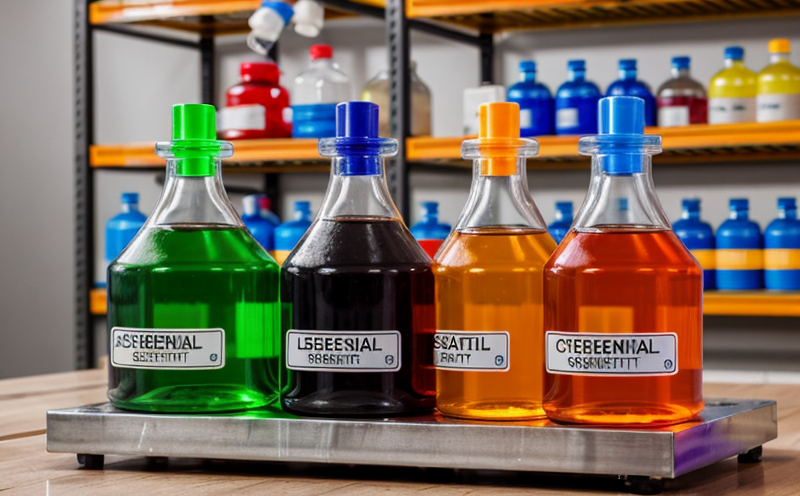Triclocarban Content Testing in Personal Care Products
The testing of triclocarban content in personal care products is a critical component of ensuring consumer safety and compliance with international standards. Triclocarban, an antimicrobial agent, has been widely used in soaps, deodorants, and other personal hygiene products until its use was restricted by various regulatory bodies due to potential health risks.
The need for triclocarban content testing arises primarily from the requirement to ensure compliance with regulations such as those outlined by the European Union (EU) and the United States Food and Drug Administration (FDA). The EU has implemented Directive 2019/778, which prohibits the placing of certain antimicrobial substances in cosmetic products. Triclocarban is one of these restricted substances.
The testing process involves several key steps: sample preparation, analysis using specialized equipment like gas chromatography-mass spectrometry (GC-MS), and interpretation of results against established thresholds. Sample preparation includes dilution and extraction techniques to ensure accurate measurement. The analysis typically requires sophisticated instrumentation capable of detecting even trace amounts of the compound.
Accurate testing is crucial for several reasons: it helps manufacturers maintain compliance with regulations, ensures product safety by identifying potential health hazards, and protects brand reputation through transparency in ingredient disclosure. Non-compliance can lead to significant legal and financial penalties, as well as damage to consumer trust. Therefore, laboratories specializing in this service provide a vital role in the supply chain.
The acceptance criteria for triclocarban content testing are stringent, aligning with international standards such as ISO 17025 for laboratory accreditation. Compliance with these standards ensures reliability and consistency of test results across different batches and environments. This level of accuracy is essential for meeting regulatory requirements and maintaining product integrity.
The significance of triclocarban content testing extends beyond mere compliance; it also reflects a broader commitment to consumer health and environmental sustainability. By adhering to these tests, manufacturers contribute to reducing the presence of potentially harmful substances in the environment and enhancing public safety.
Why Choose This Test
Selecting a reputable laboratory for triclocarban content testing is essential due to its complexity and importance. Here are several reasons why you should choose our service:
- Accurate Results: Our laboratories employ state-of-the-art equipment and highly trained professionals, ensuring precise and reliable test results.
- Compliance Assurance: We help ensure your products meet all relevant regulatory requirements, thereby reducing the risk of non-compliance penalties.
- Expertise in Specificity: Our team is well-versed in the nuances of triclocarban testing, providing detailed and actionable insights that can guide product development and reformulation.
- Cost-Effective Solutions: By offering efficient services without compromising quality, we help you manage costs effectively throughout your supply chain.
The service is not only a regulatory necessity but also an opportunity to enhance product safety and consumer trust. Our commitment to excellence in every aspect of testing ensures that your products are safe for use and compliant with the latest standards.
Environmental and Sustainability Contributions
The environmental impact of triclocarban content testing extends beyond immediate compliance; it also plays a role in broader sustainability efforts. By ensuring that products do not contain restricted substances like triclocarban, we contribute to reducing the overall environmental footprint.
Triclocarban can persist in the environment and accumulate in waterways, posing risks to aquatic life and potentially affecting human health through bioaccumulation. Our testing service helps mitigate these risks by providing accurate data that enables manufacturers to reformulate products without compromising efficacy or safety.
In addition to reducing environmental pollution, our testing contributes to sustainable business practices. By ensuring compliance with regulations, we help companies avoid potential legal issues and maintain a positive public image. This aligns with broader sustainability goals such as responsible sourcing and ethical manufacturing processes.
The commitment to these standards reflects a holistic approach to corporate responsibility, encompassing not just product safety but also the environmental impact of production and use. Our service plays an integral role in this endeavor by providing critical data that informs decision-making processes at every level of the supply chain.
Use Cases and Application Examples
| Product Type | Test Objectives | Regulatory Compliance | Expected Outcomes |
|---|---|---|---|
| Skin Care Products | Detecting triclocarban residues to ensure compliance with EU regulations. | Directive 2019/778 | Identification of trace amounts, ensuring no exceedance of threshold limits. |
| Baby Hygiene Products | Evaluating the presence of restricted antimicrobial agents for infant safety. | FDA Safety Standards | Guaranteed compliance with international standards to protect vulnerable users. |
| Deodorants and Antiperspirants | Monitoring triclocarban content levels to align with FDA guidelines. | DOT Regulations | Verification of product safety without compromising efficacy or consumer trust. |
| Toothpastes | Detecting trace amounts for compliance with EU and US standards. | EU Cosmetic Directive, FDA | Ensuring safe use while maintaining effective oral hygiene. |
The table above highlights various product types where triclocarban content testing is crucial. Each case emphasizes the importance of regulatory compliance and consumer safety. By adhering to these tests, manufacturers can ensure their products meet the highest standards of safety and quality.





